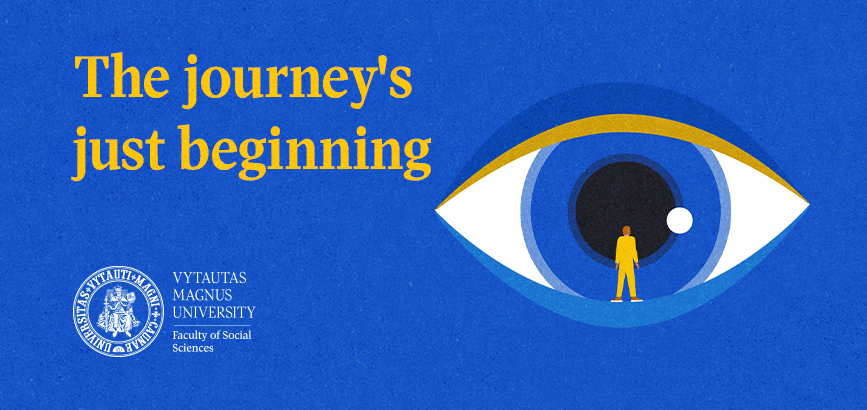About the Faculty
The Faculty of Social Sciences at Vytautas Magnus University was established on the 20th of December, 1990. Starting with around 100 students and 50 teachers in 1991, now the Faculty unites community of around 900 students, more than 80 teachers and nearly 10000 alumni.
The MISSION of the Faculty is creation of new knowledge and activities in collaboration with diverse social groups and communities, striving to nurture strengths and dignity of a person, foster social well-being and contribute to the development of creative society at the local, national and international levels. The Faculty VALUES creativity, diversity and collaboration, focuses on the innovative studies and breakthrough research, cherishes personal, academic freedom and responsibility in the face of social change. Its MOTO – Let’s discover and act together.
The main OBJECTIVES of the Faculty are related to 1) preserving safe, healthy and inclusive environment – an attractive workplace for researchers, teachers and administrative staff, and a place where students enjoy learning and being, alumni want to come back; 2) strengthening of social sciences (sociology, anthropology, social work and psychology) research, international collaboration; 3) increasing the quality of social sciences (sociology, anthropology, social work and psychology) studies and proposing the variety of learning forms; 4) contributing to regional and international societal development, policy change through collaborative partnerships within and outside the University.
The Faculty RESEARCH and STUDIES are designed and projected to address the main challenges societies experience locally and globally (e.g. social cohesion, human rights and social justice, social and economic inequalities, social inclusion, demographic challenges, mobilities, reaction to COVID and/ or climate change, safe and risky behavior, well-being, mental health, empowerment etc.). Objectives, priority activities and themes of the Faculty are closely related to the tendencies of the Lithuanian research and education future vision Lithuania’s Progress Strategy “Lithuania 2030”, Lithuania’s Progress Strategy “Lithuania LT2050” and comply with the priorities of the European Research Area established in the strategic document of the EU Research and Innovation Program of “Horizon Europe until 2027”. Studies at the Faculty are based on the principles of liberal arts teaching, the culture of discussions, development of critical thinking, creativity, synergy between theory and practice, participation in different academic and extracurricular activities, volunteering.
STUDIES are carried out in 3 bachelor degree programs (Psychology, Social Work and Psychosocial Counseling, Society, Culture and Communication, Sociology and Anthropology (specializations Sociological and Anthropological Studies studies and Society, Culture and Communication (in EN)), 6 master degree programs (Organizational Psychology, Health Psychology, School Psychology, Social Work (specializations Transformative Social Work and Social Work in the Context of Global Crises), Applied Sociology, Social Anthropology) and 2 PhD degree programs (Psychology, Sociology). The Faculty also offers unique opportunities for INTERNATIONAL European and transatlantic studies. Professors and students participate in joint projects and exchange programmes. Master students can obtain the Anthropology certificate from the Southern Illinois University (USA). Joint lectures of social work with the Chicago Loyola University (USA) take place via video conferencing. Annual video conferences with psychology students presenting their academic research are organized in collaboration with the University of Nebraska at Kearney (USA).
Major RESEARCH areas at the Faculty are: social inequalities, social inclusion and minority group studies; demographic challenges, primary healthcare system and behaviour of health consumers; citizen participation, identity and citizenship; analysis of social policies and development of social work interventions with the aim of empowering people and their social inclusion; transnational mobility, ethnicity, and intercultural understanding from an anthropological perspective; investigation of psychological and behavioural factors related to disease development, successful health promotion, and rehabilitation; safe and risky behaviour on the road; analysis of psychosocial development, adjustment, and the effectiveness of teaching and learning process in individuals of various age groups; psychological analysis of human resource management and investigation about psychological incentives of employee wellbeing.
Three MAIN CHARACTERISTICS about the Faculty of Social Sciences. Firstly, the Faculty can be proud of the high quality of its studies – independent foreign experts rated the Psychology, Sociology, Anthropology and Social Work programs (bachelor’s and master’s) with the highest points and accredited them for the maximum period. Despite the demographic challenges, the Faculty maintains stable student enrollment rates. Secondly, the teachers working in the Faculty are active researchers preparing applications and implementing applied and scientific projects at both national and international levels. Moreover, they are well-recognized experts in their field, sharing knowledge with scientific community, public administration and other institutions and the society in Lithuania and abroad. The variety of initiatives and activities of the Faculty members is truly exceptional. And most importantly, at the Faculty we pay a lot of attention to community – we encourage communication, cooperation and solving problems together. We try to create a space that gives freedom to thoughts, drive to feelings and vigor to actions. Together WE #VDUsmf can grow and develop.













